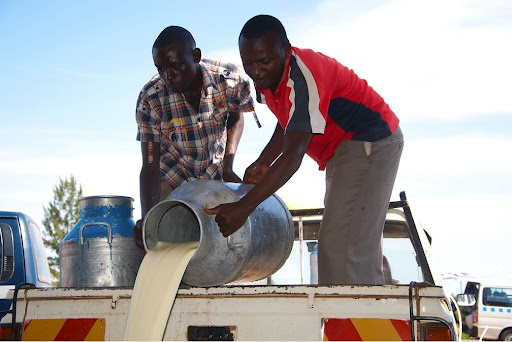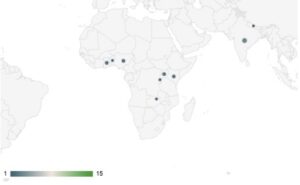DAISI announces funding for One Full RCT, Two Pilots, and Five Proposal Development Grants from Spring 2023 Competition Round

Photo Credit: Dick Wåhlin via Flickr
The Digital Agricultural Innovations and Services Initiative (DAISI) was launched in 2021 to rigorously evaluate programs that increase the availability, quality, and reach of bundled, digital agricultural solutions and services for small-scale agricultural producers. DAISI’s research agenda is oriented around six main themes which aim to shed light on what drives farmers’ adoption of digital services, the impacts of these bundles on agricultural outcomes, and which element(s) of a bundle are key to its success, as well as implications for indirect impacts. DAISI also prioritizes research which generates evidence on three cross-cutting themes of empowering women farmers, engaging youth in agriculture, and increasing the resiliency of small-scale producers against climate change.
In Spring 2023, DAISI implemented one funding competition and awarded research funds to one full randomized evaluation, two pilots, and five proposal development grants in Ghana, India, Kenya, Nepal, Uganda, and Zambia. Read more about the funded projects below, and refer to our previous funding update for projects funded in 2022.

To date, DAISI has funded 15 projects in 9 countries.
Combining Edutainment with Market Access
Extension services play an important role in assisting farmers to make well-informed decisions about adoption of new technologies or practices. However, most studies on public and private extension programs find that offering information alone has modest impacts on adoption of existing agricultural technologies, irrespective of the mode of delivering the information [1]. In a full randomized evaluation in Zambia, J-PAL Affiliate Shilpa Aggarwal (ISB) and CEGA and J-PAL Affiliate Jon Robinson (UC Santa Cruz) will investigate how bundling delivery of a television-based extension show with market access via road shows (locally-held events in which input providers make their products and services available for sale) impact farmer knowledge, input adoption, and female empowerment. The impact evaluation is designed to understand the complementary roles of information (provided through TV) and market access (provided through road shows) in driving take-up of productivity-enhancing practices and technologies.
Improving Outcomes for Cooperative Agriculture
Agricultural cooperatives may support small-scale producers to build a profitable farm enterprise. While there are various cooperative models, common models include individuals’ pooling of resources to gain better purchasing power for agricultural inputs or achieve economies of scale for post-production activities such as processing, packaging, and distribution. Digital services marketed towards agricultural cooperatives are growing and have the potential to improve profitability and productivity of farmers, yet their impacts on producers are understudied [2].
CEGA Affiliate Travis Lybbert (UC Davis) and co-investigators are conducting a pilot study to assess the take-up of a digital marketing tool for livestock cooperatives in Nepal. These cooperatives are often supported by Community Animal Health Workers (CAHWs), government-licensed paraveterinary workers who are trained to provide basic livestock care on a fee-for-service basis. CAHWs provide a unique professional career path for women where other opportunities are limited. In addition to providing veterinary services, CAHWs are well positioned to improve farmer connections to output markets. In this study, CAHWs will utilize a digital collective marketing tool to digitize inventory data from cooperative members and transmit this information to cooperative leaders who would then use the data to negotiate sales with traders. The take-up results of the study will inform a future randomized evaluation and provide insight into the feasibility of using a digital collective marketing tool to improve market linkages and rural women’s entrepreneurship in the livestock sector.
In Uganda, graduate student Pedro Magana Saenz (UW Madison) and team are partnering with an agricultural app that simplifies bookkeeping and provides credit scoring for dairy farmers belonging to milk cooperatives. In this study context, dairy farmers often use transporters, or intermediaries, to transport and sell their daily milk production to cooperatives. The financial transactions are often unrecorded, and because farmers do not have information on the cooperatives’ daily prices, they may not receive optimal prices for their milk. If farmers have more access to both price and delivery information, they might be able to improve their bargaining position with intermediaries, incentivizing milk deliveries and revenue. The pilot will prepare for a randomized evaluation to generate new evidence on the impact of providing farmers’ with better price information via milk transaction receipts that are used to generate credit scores for farmers.
The Importance of Early Stage Development to Scope Partnerships and Early-Stage Questions
DAISI funds small grants to support preliminary, exploratory research activities, including researcher travel. These grants facilitate opportunities for researchers and partners to develop trust and scope early-stage evaluation questions.
- In Kenya, Guanghong Xu and partner organization International Livestock Research Institute (ILRI) Kenya examine potential for digital traceability along the Kenyan dairy cooperative value chain as a strategy to address product quality challenges and reward upstream producers for better milk quality. This proposal development grant plans towards a randomized evaluation assessing the impact of a digital traceability system sharing milk quality information to cooperatives, bundled with input credit.
- In Ghana, Carlos Sakyi Nyarko and Jamal Mohammed explore the feasibility of a future randomized evaluation to evaluate the impacts of a digital platform that provides farmers with weather and market information, financial services, and access to inputs to improve farming activities. Researchers plan to investigate gender-based barriers to the adoption of the platform.
- In Uganda, Iacopo Bianchi, et. al, investigate an input and service-sharing digital platform and explore its impact on agricultural productivity for farmers and agricultural workers. To plan for a future randomized evaluation, researchers will determine how easily the platform can collect detailed transaction data, understand farmers’ and workers’ interest in adopting the platform, and examine potential gender differences in adoption patterns.
- In India, Kyle Emerick and Tomoko Harigaya explore a data sharing agreement with a local input supplier of a new climate-resilient seed variety (chickpea) in Gujarat, India to prepare for a bundled intervention that targets agrodealers with advisory services and new seed varieties, akin to Dar et al. (2022).
- In Nigeria, Oluwabunmi Adejumo, et. al, gather information on a program that provides real-time agricultural extension and market access services to youth engaged in micro-livestock production [e.g., heliciculture (snail), apiculture (bees), fishery, and cuniculture (rabbits)] in southwest Nigeria. Researchers will survey rural micro-livestock producers to understand their needs and knowledge gaps, and plan towards a future randomized evaluation.
Sources